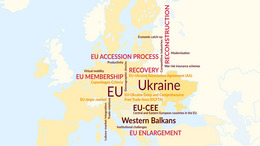For years, Moscow had denied its military presence in Ukraine and claimed that Ukrainian separatists were only fighting there on their own initiative—although the Russian command of the alleged separatists, for example by the long-time deputy head of the Kremlin administration Vladislav Surkov, was well documented. The large-scale invasion from three directions has put Russia's role as aggressor in the spotlight, as well as the military support by Iran and North Korea and the Chinese backing for Moscow. The EU's solidarity in standing by Ukraine in this war supports the continuation of the international order. Whether Europe's resolve will endure and lead to further action in time will determine security, peace, progress, and prosperity within Europe's borders and beyond.
European self-assertion in a new systemic conflict
Helping Ukraine to victory is the blueprint for European self-assertion against Putin's revisionist imperialism. Russia is a strategic adversary of the EU and democratic Europe. Gone are the days of Vladimir Putin's dual roles as a supposed peace mediator and simultaneous disruptor of the international system, denying facts and truths. As Ukraine fights for its existence, it has become a certainty in the EU that Europe is a continent of divided security, with some countries protected by their NATO membership and some without protection.
Does the political West achieve a fundamental “Realpolitik” shift?
To militarily stop the Kremlin in the long term and deter new attacks, the G7 and other countries are currently concluding bilateral security agreements with Ukraine. However, these do not entail obligations comparable to the security guarantee under Article 5 of the NATO Treaty, and they are also viewed critically in Kyiv, especially in light of the Ukrainian experience with the Budapest Memorandum of 1994. In it, the United Kingdom and the United States (along with Russia) assured Ukraine that they would respect its independence and existing borders.
Consistently, a majority of citizens of the EU express support for a common EU defense policy. In a recent eupinions poll by Bertelsmann Stiftung support reached an overwhelming 87 percent. The Union urgently needs to expand its military capabilities within the framework of the Common Security and Defense Policy and deepen its cooperation with NATO – as a reliable 'European pillar.'
Vladimir Putin's goal is nothing less than to end the existence of Ukraine and to invalidate the Western security architecture.
Challenges for Ukraine: Survival, reconstruction, and EU membership
Despite undeniable deficits, such as corruption, which Ukraine is persistently combating, Ukraine is defending the values upon which the EU is founded. It is only logical that the Union no longer distinguishes between neighborhood and enlargement policies, seeks enlargement for geopolitical reasons and has put forth the prospect of membership for Ukraine (among other countries). For this policy shift to be implemented, the EU must reform its own structures and procedures, starting with its capacity to act, for example, by generally making decisions by a qualified majority and abolishing the right of veto.
Ukraine's resilience, stability, and problem-solving capabilities are remarkable in the face of ongoing destruction and millions of its citizens living as refugees. However, the current situation at the front lines is a war of attrition with heavy losses. Russia has the advantage, however, with greater resources and an approach to warfare that does not shy away from human casualties. Whether Ukraine survives as a state depends crucially on its allies providing more comprehensive support in time. This requires increasing their own military production capacities, overcoming fragmented markets, and deciding on further arms deliveries that benefit Ukraine in its defense.
The existential challenges posed by the war require extraordinary responses. Ukraine's partners should not limit themselves to emergency aid but also strategically support reconstruction to achieve what the majority of people in Ukraine and in the EU express as their will: that Ukraine persists as a liberal democracy and, following the principle of 'build back better,' can eventually catch up with the EU. In the recent eupinions survey, 60 percent of respondents across the EU support Ukraine's future EU membership.
The early EU initiatives also focused on synergies, leading to the Ukraine Facility. The financial package was finally adopted in January 2024 for the remaining four years of the current EU financial framework. The 50 billion euros envisaged there intertwine reconstruction and modernization with the EU accession process. However, this amount can only be the beginning of what needs to be spent to secure Ukraine's social, economic, and political survival. Against this backdrop, it is worth considering whether Russian central bank assets can be utilized.
A resilient future perspective is crucial
Return, reconstruction, and EU accession form a triad that can only unfold if, in addition to security, their social, economic, and political perspective also convince Ukrainian citizens to stay in or return to their country. The EU stance can only remain a light at the end of the tunnel if a visible framework promises stability so that public funds can eventually mobilize private investments.
Whether, when, and in what form Ukraine actually joins the EU depends largely on the outcome of the war. The fact that people are increasingly missing because many have died, are war-wounded, or have fled is a topic of every consideration of Ukraine’s future planning and an alarming challenge according to every scientific model.
Negotiating with a dictatorship that ideologizes war?
Alexei Navalny’s death illustrates that Russia is both weak and strong in the war – a country whose supreme warlord Putin has tied his own fate to subjugating Ukraine. Putin meanwhile portrays Russia as a champion against U.S. dominance and seeks alignment with countries of the so-called Global South, few of which to this day recognize or criticize Russia's colonial role in Eastern Europe and Central Asia. Given the global impact of the war, the responsibility of Ukraine's allies grows; alliances are increasingly important to provide long-term resilient responses in the systemic conflict between liberal democracies and authoritarian states.
So far, Ukraine's partners have provided insufficient support. Bringing Ukraine into a superior position is a prerequisite for Russia to abandon its goal of destroying Ukraine's independent existence. Only then can an end to the war be conceivable.
Ukrainians will decide when and what to negotiate, security guarantees remain key
After two years of war, immense sacrifices, and an acute shortage of weapons and ammunition, it is no longer a taboo in free Ukraine to question whether full territorial integrity is currently achievable. Sovereignty and alliance choice, however, are non-negotiable, as this would mean accepting life under the dictatorship of Vladimir Putin. He is prepared for a long war and has openly stated for two years that his aim is 'historical Russia' and Europe as of 1997, i.e., without NATO forces in Poland, the Baltic states, Romania, Hungary, the Czech Republic, Slovakia, Albania, and the countries of the former Yugoslavia.
If Ukraine is to avoid being increasingly pushed into a weak position, its effective defense and deterrence of Russia is without a realistic alternative. Right now, when the situation is not yet lost, but psychological and physical strength is reaching their limits due to unequal power relations, it is time for Europe to clearly position itself and act – and not least, in light of U.S. developments, to take responsibility for its own security. Europe has the means, and the Ukrainians (for now) have the willpower.
![[Translate to English:] Ukrainische Fahnen zur Unterstützung der ukrainischen Streitkräfte im Zentrum von Kiew während des Krieges mit Russland; Fähnchen stehen gleichzeitig für gefallene Soldaten](/fileadmin/files/_processed_/5/d/csm_shutterstock_2320840647_Premier_ST-EZ_939a9b5c94.jpg)

![[Translate to English:] Die Flaggen der Ukraine und der Europäischen Union flattern im Wind am blauen Himmel](/fileadmin/files/_processed_/5/b/csm_AdobeStock_504331922_KONZERN_ST-EZ_6e1eaed30a.jpg)

![[Translate to English:] Weltkarte](/fileadmin/files/_processed_/2/e/csm_AdobeStock_143550481_KONZERN_ST-EZ_ID-1729_Titel_Interconnectivity_2023_02_535bd86918.jpg)


